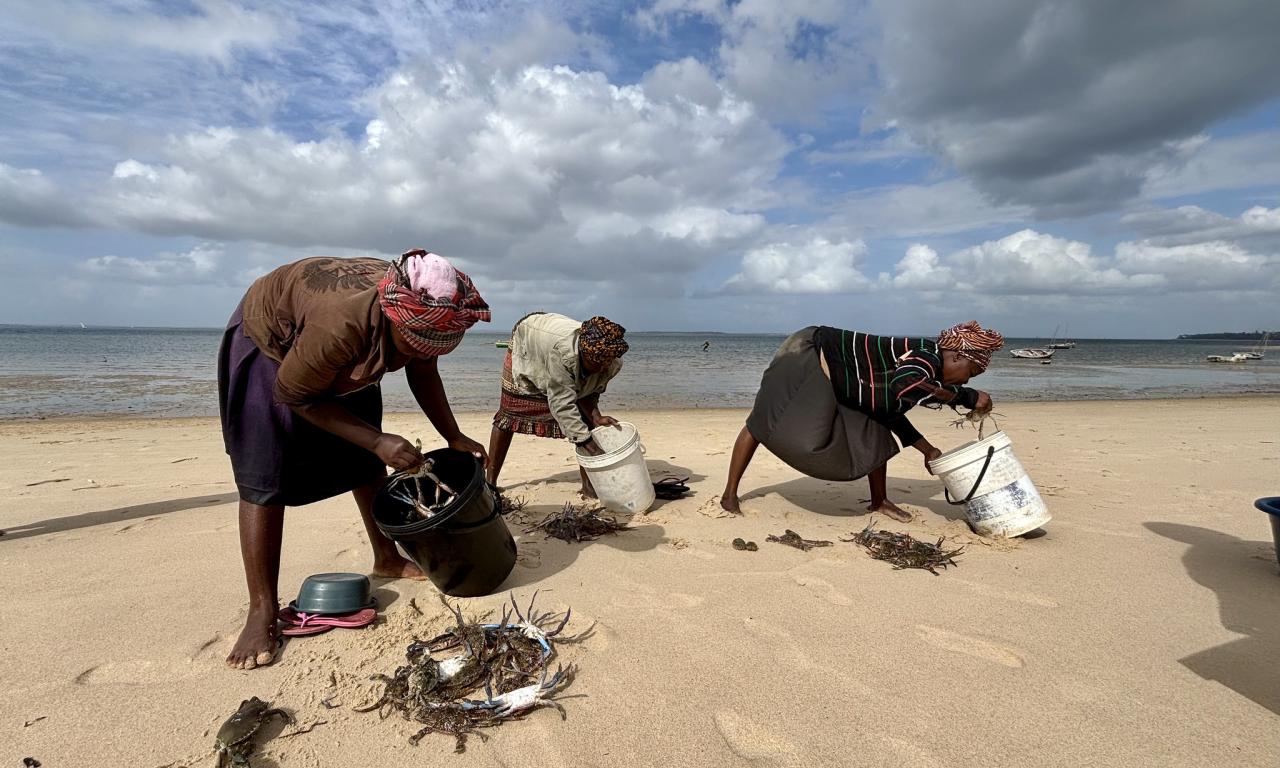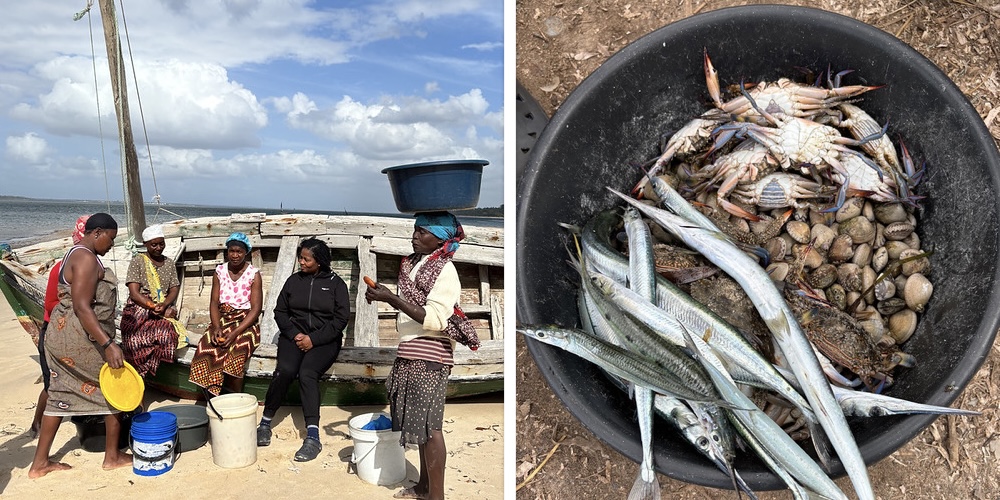
At dawn in coastal Mozambique, groups of women make their way to the shore. Some walk alone, others accompanied by children or neighbors, but all are there to glean. For 6 to 8 hours each day they wade through shallow waters, searching and collecting crabs, clams, oysters, and other bivalves. The gleaners then carry their harvests back to the shore or home. But that’s not the end of the work. Women gleaners also take on the labor-intensive task of processing oysters and clams, shucking, washing, boiling, smoking, and drying them, often for a further 2 to 3 hours. Gleaning is hard work, grueling, uncertain, and deeply undervalued but is a vital source of sustenance and income, sustaining families and feeding coastal communities.
Why This Work Matters
Gleaning plays a critical yet often invisible role in coastal food systems. While commonly viewed as a low-value or subsistence activity, early insights from our research reveal that gleaning is a central livelihood strategy, especially for women. It is vital for household nutrition, resilience, and boosting local economies.
In June this year we conducted a scoping study on gleaning activities in Mozambique under the Asia—Africa BlueTech Superhighway (AABS) project. Conducted across three coastal districts of Inhambane Province - Cidade de Inhambane, Maxixe, and Inhassoro, the study explores gender dynamics, livelihoods and losses along the gleaning value chains.
Through focus group discussions (FGDs), key informant interviews (KIIs), and household surveys, the study will seek to elevate the voices and aspirations of gleaners, those most affected by the shifting climate, economic, and social pressures
This research fills a crucial knowledge gap in fisheries development by recognizing and documenting the intricate, gendered contributions of gleaners. It challenges simplistic assumptions about who does what in coastal livelihoods and exposes the structural barriers that prevent women from accessing resources, markets, and decision-making spaces. It is a call to reframe gleaning as a complex, socially embedded practice that deserves investment, innovation, and inclusion.

Challenging Gender Norms and Advancing Inclusion
Gender equality and social inclusion (GESI) lie at the heart of this research. From design to implementation, the study interrogated how gender norms shape who gleans, who benefits, and who bears the risks. Preliminary findings indicate that women are overwhelmingly responsible for harvesting, processing, and selling gleaned resources—yet they lack access to cold storage, safety equipment, credit, and decision-making spaces. They are also burdened with unpaid domestic labor, limited mobility, and high vulnerability to post-harvest losses.
In some communities, such as those in Inhassoro District, men and women collaborate more closely across the value chain, with shared decision-making and pooled income. This household approach improves adaptability and resilience. In contrast, communities in Maxixe and Cidade de Inhambane often show sharper gender divisions, with women isolated in low-return roles and men controlling high-value assets and markets. These findings emphasize the importance of considering context-specific factors influencing gender dynamics at the household, community, and gleaning value chain.
Despite these constraints, women organize collective savings groups. Women’s collective action allows them to negotiate prices, manage household provisioning, and express strong aspirations for improved livelihoods.
Early findings also revealed how intersecting factors, such as youth unemployment, lack of formal education, and climate vulnerability, compound the exclusion of women and youth. By integrating a GESI lens into every stage of research, the study not only collected data but also created inclusive spaces for reflection and learning.
From Insight to Action
The study identifies priority areas for future action for policymakers, NGOs, and development partners including,
- Recognizing and including women gleaners in fisheries data systems, management bodies, and policy discussions.
- Investing in infrastructure to improve access to water, electricity, cold storage and communal processing centers would help reduce losses.
- Support for safety and mobility such as offering swimming lessons and safety equipment tailored to suit women’s needs and strengthening financial inclusion.
To enhance resilience to climate risks, policy stakeholders are urged to support community-led adaptation efforts and enhance social protections for informal workers. In addition, promoting fair market systems that facilitate collective marketing and transparent price information would contribute to reducing dependence on middlemen and benefit the gleaners more. They would also benefit from expanded vocational training and seed funding for women and youth-led enterprises that would enable them to build their entrepreneurship skills.
Gleaning in Mozambique is a lifeline, a tradition, and a source of solidarity. Yet, unless we listen to and invest in the gleaners themselves, particularly women gleaners, their work will remain undervalued and unsupported. By amplifying gleaners’ voices and sharing their lived realities, we hope this study will contribute not only to academic and policy debates but also to tangible shifts in how coastal development is designed and delivered.
Cover photo: Sorting their harvest, women gleaners show their catch to traders, each selling individually, yet coming together to collectively negotiate prices because they know their power comes from their sisterhood. Photo by Sara Bonilla-Anariba/WorldFish.

